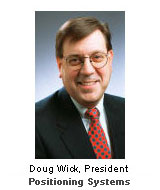
The attraction to business development and E-Myth Mastery almost always centers around systems. Business people have an "aha!" moment when it finally dawns on them that building a business that can replicate itself and duplicate the work they do is as simple as building system. How to build system may require help, but the simplicity of this is certainly the genius that Michael Gerber recognized and what makes his book "E-Myth Revisited" so magnetic.
Yet, truth be told, there is a very powerful element that must be included in every business that is in many ways just as important as systems. In fact, an argument could be made that it is more important than systems but I’m not about to go there in trying to rank them. Let’s just say this needs to be used in partnership. Within the Mastery business development program we have a process entitled, The Business Plan That Always Works. Most business owners would laugh and scoff at this idea. "Are you kidding me? What business plan always works?"
The business plan that always works is based on the heart: the heart of the owner, the heart of the employees and its target is the heart of the consumers. Most business owners concentrate on logic. In fact, when business fades, it is almost invariably the response of the owner to lower his prices, forgetting what got him to his lofty perch in the first place — the love the customers had for the way he did business. Lowering prices is a short term strategy — in fact, it should be called a tactic. As a strategy, lowering prices better be short-term or it is a recipe for disaster. Unless you’ve discovered an innovative approach that lowers your costs to an outrageous advantage over your competitor and you believe you can continue to do so, cutting prices is not a strategy for long-term success.
At the core of every buying decision is emotion. Dr. David Hawkins’ book "Power vs. Force" is one each of you should read. It provides a scale of consciousness that starts at 1 and goes to 1,000. It suggests that every decision can be calibrated. Whole continents, individuals, countries, even fruits and vegetables can be calibrated through kinetic testing to determine the truth about them. Hitler, Churchill, Christ, Gandhi — he has calibrated their level of consciousness and he reveals some interesting, if not controversial, ideas. What is interesting to you and your business is that levels above 400 on Dr. Hawkins’ consciousness scale are beyond logic, and this is where he suggests power comes from. And just as importantly, power always will overrule force in any conflict.
As an example, Hawkins offers Gandhi’s amazing drive for independence which brought the most powerful country in the world to its knees with very little, if any, bloodshed. If you don’t believe that power (heart centered principles) can overrule force, just examine your own work force. Who would you rather have work for you? Someone who comes to work every day motivated, inspired, enthusiastic and ready to put in a full day’s work? Or someone you have to cajole, monitor and maybe even admonish to do their job? The latter you must motivate by force, and as Michael Gerber notes, we can’t motivate anyone. Force requires energy and that energy is eventually depleted working endlessly to get others to do what we want.
The key to building a lasting business — one that you can be free from — is to capture the emotion of your business and get your people and customers to buy into it willingly. The vibrations of the heart, those levels of consciousness that Dr. Hawkins indicates oscillate above 400, are critical to operating your business effectively.
We’ve all worked for companies and managers that inspired us to do more. How did they do it? By logic, by appealing to our minds or did they appeal to our hearts? A cause that is just and inspiring can move mountains. Building your business requires systems. Perhaps the most critical system your business needs as it approaches 2007 is a system to build "heart."



